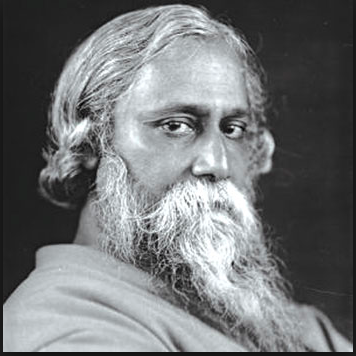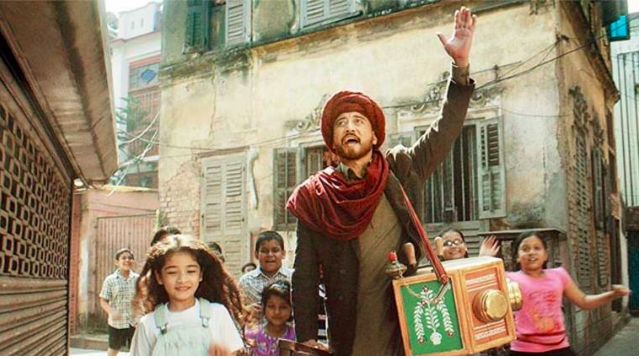|
This blog reviews two events that draws inspiration from Rabindranath Tagore's work: a new bollywood film, Bioscopewala, and two hour long NCPA's Tagore dance and music event. A few days ago, I had a chance to watch a Bengali cultural programme at NCPA, Mumbai. Apparently it was NCPA's first time to organise such an event marking celebration of Rabindranath Tagore's 157th birthday. Dance and music of Tagore refreshed childhood memories of what was to be a Bengali girl.... in Mumbai! "You are a Bengali only when you can recite a Tagore's poem, sing, and dance to the tune of Rabindra Sangeet", Biren dadu warned us. Summer holidays for my friends and me ( in the age group of five to twelve years old) used to be typically spent learning how to read and write the Bengali script in the afternoon, and in the evening dance rehearsals with live music - harmonium, tabla, dholak, mangira while kakus and kakimas had no shy to practice Rabindro sangeet that would echo in our neighbourhood. Every year, we'd to perform for Tagore's Birth Anniversary celebration in Kurla Camp, Ulhasnagar, in the outskirts of Mumbai! Years later I came to realise that Kurla Camp in those days (1980s) was like a probashi Bengali ghetto in the midst of Sindhi colony. The Kali bari (goddess Kali's temple) was literally the center of the earth for the Bengalis in Kurla Camp - everything evolved around it - from the fish market, to bengali sweet shops and library. My friends had assured me that being Ghoti means that I came from the right side of the planet! As a child, I began noticing the difference between Ghotis and Bangals it existed subtly in language accent, food habits.. (or click here https://www.thequint.com/campaigns/bol/ghotis-and-bangals-decoding-a-very-bengali-rivalry). This divide was invisible when it came to prepare for Robi Thakur's on 25th Boishakh celebration, which was in the month of May - everyone would pitch in to prepare the script/ballet, selection of songs, improvisation of our dance movements etc. Aj dhaner kheter, Eso shyamal sundoro, or momo chitte neete nitte ke je nache ta ta thoi thoi .. Best part was that the shy girls, like me, would be completely transformed as a confident perfomer on the stage; little did I knew it was a killer way to teach us team work in an early age. In 2010, my mother at the age of 67 years announced she wanted to learn harmonium and Rabindra Sangeet! She wanted to fulfil her bucket list. For the next five years she mastered the art of singing numerous Tagore's song and playing harmonium. Till my mother's death in May 2015, she continued to learn this art from her much younger teacher friend, Deboshri kakima. I'd almost lost touch of this tradition and it was refreshing to attend NCPA's two hour event on Tagore's dance in may ways. At Experimental Theatre, NCPA, the evening event was for two hours with three performances. The first one was similar to what I'd performed as a child, titled 'Robir Rongey - Tagore through colours and mood'. The second performance was about Ragas and Keertans from Tagore's songs introducing Baul geet and a nice twist of Manipuri and Bharatnatyam fusion. The final performance was from Srijon institute that put me off (and to top it, they used recorded songs; no live music). I left immediately after 10 mins of this last performance. I must admit that the event didn't meet any expectation and I came out disappointed - except the live music of the initial presentations were remarkable. The NCPA needs to review the troupe's performance before engaging in curating an event to avoid unforgettable experience in a negative way! I enjoyed relatively nice show by Shahana and Pubali and Angik. BIOSCOPEWALA
Bollywood films are not for me. In 2017 the only film I watched (and actually paid for ticket at the theatre) was Newton. It's mid 2018 and Bioscopewala is the first and the only Bollywood film I watched. If I've to describe this film in one word, then that word would be 'choppy'. Yet, I loved it and I'm able to relate and empathise with the Director who have kept the dialogues to minimal and let the camera do the action. I wonder why we need so much of dialogues - words eating words. That's probably what I think my film editor at Landing Together films likes to do as well - use less words :-) Overall, Bioscopewala film has nicely used Tagore's lovely story Kabuliwala. I wish Danny Dengzonpa and Kala had got a little bit more space to show their talent - such a beautiful casting. I haven't seen any films of Adil Hussain, but even his acting got lost in the film that didn't capture the father-daughter relationship. Yet, the Deb Medhekar, the director, has nicely managed to pull the story. The rest of the actors didn't impress me enough. I think the film is refreshing, sweet and small, and you come out of the theatre feeling good - especially if you are a Bong like me (or know Bengali language) its a nice treat.
0 Comments
|
Privacy Policy: We use Google Analytics to collect data to improve the Website. By using and accessing the website you are consenting to use of Google Analytics. All Rights Reserved.
ARchIvES
March 2019
CATEGORIES
All
Privacy Policy: This website uses Google Analytics to improve the Website. By using and accessing the website you are consenting to use of Google Analytics.
|


 RSS Feed
RSS Feed
